HBI Series on Jewish Women
Shulamit Reinharz, General Editor
Sylvia Barack Fishman, Associate Editor
The HBI Series on Jewish Women, created by the Hadassah-Brandeis Institute, publishes a wide range of books by and about Jewish women in diverse contexts and time periods. Of interest to scholars and the educated public, the HBI Series on Jewish Women fills major gaps in Jewish Studies and in Women and Gender Studies as well as their intersection.
The HBI Series on Jewish Women is supported by a generous gift from Dr. Laura S. Schor.
For the complete list of books that are available in this series, please see www.upne.com
Sonja M. Hedgepeth and Rochelle G. Saidel, editors, Sexual Violence against Jewish Women during the Holocaust
Julia R. Lieberman, editor, Sephardi Family Life in the Early Modern Diaspora
Derek Rubin, editor, Promised Lands: New Jewish American Fiction on Longing and Belonging
Carol K. Ingall, editor, The Women Who Reconstructed American Jewish Education: 19101965
Gaby Brimmer and Elena Poniatowska, Gaby Brimmer
Harriet Hartman and Moshe Hartman, Gender and American Jews: Patterns in Work, Education, and Family in Contemporary Life
Dvora E. Weisberg, Levirate Marriage and the Family in Ancient Judaism
Ellen M. Umansky and Dianne Ashton, editors, Four Centuries of Jewish Womens Spirituality: A Sourcebook
Carole S. Kessner, Marie Syrkin: Values Beyond the Self
Ruth Kark, Margalit Shilo, and Galit Hasan-Rokem, editors, Jewish Women in Pre-State Israel: Life History, Politics, and Culture
Tova Hartman, Feminism Encounters Traditional Judaism: Resistance and Accommodation
Anne Lapidus Lerner, Eternally Eve: Images of Eve in the Hebrew Bible, Midrash, and Modern Jewish Poetry
Margalit Shilo, Princess or Prisoner? Jewish Women in Jerusalem, 18401914
Marcia Falk, translator, The Song of Songs: Love Lyrics from the Bible
Sylvia Barack Fishman, Double or Nothing? Jewish Families and Mixed Marriage
Avraham Grossman, Pious and Rebellious: Jewish Women in Medieval Europe
Iris Parush, Reading Jewish Women: Marginality and Modernization in Nineteenth-Century Eastern European Jewish Society
Sephardi Family Life
 in the
in the
Early Modern Diaspora
Edited by
JULIA R. LIEBERMAN
BRANDEIS UNIVERSITY PRESS
Waltham, Massachusetts
Published by University Press of New England
Hanover and London
Brandeis University Press
Published by University Press of New England
www.upne.com
2011 Brandeis University
All rights reserved
For permission to reproduce any of the material in this book, contact Permissions, University Press of New England, One Court Street, Suite 250, Lebanon NH 03766; or visit www.upne.com
Library of Congress Cataloging-in-Publication Data
Sephardi family life in the early modern diaspora / edited by Julia R. Lieberman.
p. cm. (HBI series on Jewish women)
Includes bibliographical references and index.
ISBN 978-1-58465-916-7 (cloth: alk. paper) ISBN 978-1-58465-957-0 (pbk.: alk. paper) ISBN 978-1-58465-943-3 (eBook)
1. JewsTurkeyHistory16th century. 2. Sephardim TurkeyHistory16th century. 3. Jewish converts from ChristianityItalyHistory17th century. 4. Jewish womenHistory16th century. 5. Jewish womenHistory17th century. 6. SephardimSocial conditionsEurope, Western. 7. Jewish childrenSocial conditionsEurope, Western. 8. Family lifeEurope, Western. I. Lieberman, Julia Rebollo. II. Title. III. Series.
DS135.T8S426 2010
305.89240560903dc22 2010035171
Foreword
This fascinating collection of essays illuminates the diversity of the post-Inquisition Sephardi Jewish experience through the lens of domestic life. Julia R. Lieberman and a team of international scholars explore both daily and dramatic aspects of Jewishness within diverse types of Jewish families in Italy, Holland, and across the Ottoman Empire, breaking new ground on important and often understudied chapters in early modern Jewish social history.
During the fourteenth and fifteenth centuries some Jewsand some crypto-Jewscorrectly assessed the bleak future of Iberian Jewish life and set off for whichever locations were currently allowing Jewish immigration. In August 1492, following the Expulsion of all Jews and Jewesses, the last professing Sephardi Jews left Spain. They joined brothers and sisters who preceded them to form new, distinctive, and often vibrant Jewish communities. Sephardi Jewish families who relocated into the Ottoman Empire arrived at their new homes with understandings of Jewishness, gender role construction, family structure, community organization, and relationship with outside cultures that differed substantively from those in many Ashkenazi societies. Many Jews who had lived in Spain and Portugal, for example, had adopted prevalent cultural attitudes toward womens appropriate roles, which were in general fairly restricted. (In contrast, from the Middle Ages onward Ashkenazi women played important roles as brokers for Westernization; through their marketplace activities, these women helped to move European Jews toward the gradually emerging middle class.)
Some of the Sephardi Jews who emigrated immediately before and after the expulsion were deeply religious Jews who lived according to rabbinic dictates in their new homes. Sephardi scholarswho had long been among the intellectual stars of rabbinic thinking and writingcontinued with their scholarship. The Jewish communities they created continued to develop in particularistic ways, as transplanted Jews interacted with the cultures of their new neighbors.
Later emigrants of Jewish background from the Iberian Peninsula to Western countries brought with them yet another approach to Jewishness, profoundly influenced by the repressive socio-religious and political conditions they had endured. The years of anti-Jewish riots and cataclysmic persecution that precipitated the conversion of some of the most distinguished, well-educated, and affluent Sephardi Jewish familiesfrequently thousands at a timealso had an impact on their relationship to Jews and Jewishness. Those crypto-Jews who remained in Spain and Portugal even after the Expulsion often lost touch with evolving halakhic developments in rabbinic Judaism. Some were suspicious of halakhic rules and norms they encountered when they eventually emigrated and made contact with traditionalist Sephardi Jews whose religious and cultural lives were more established. Conflicts sometimes erupted between earlier and later emigrants. Even for those who shared religious intensity, important customs often differed significantly.
Nowhere were those arguments more significant, contentious, and fraught with religious and social significance than those cases that focused on the roles of women, the rites of marriage, and the structure of the family. Court cases, responsa literature, letters, memoirs, sermons, and other sources reveal stories that are compelling, some intriguing, some pathetic, with details of licit and illicit loves, children born and named in the synagogue and those born out of wedlock and deprived of primogeniture, fortunes made and stolen and squandered. Status within the Jewish community and peoplehood often hung in the balance for the individuals involvedand communal power hung in the balance for rabbis and leaders who provided conflicting sources of authority.

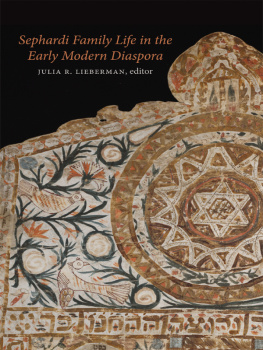


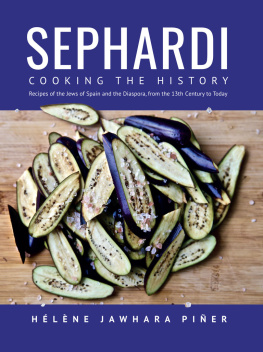
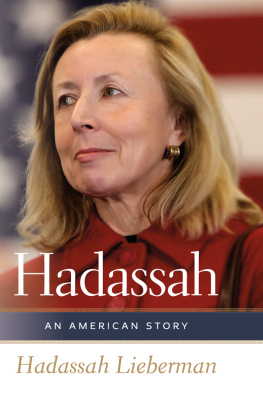

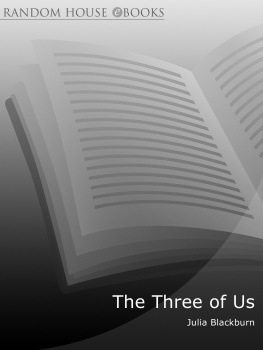
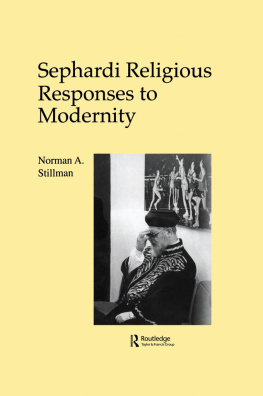

 in the
in the